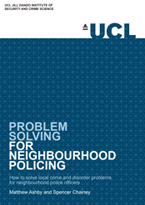 Matthew Ashby and Spencer Chainey
Matthew Ashby and Spencer Chainey
UCL Jill Dando Institute of Security and Crime Science
Overview: Solving local crime problems is important because if they aren’t solved they will continue to damage the lives of the people who live in your community. Residents and others are likely to feel unsafe and to have a negative opinion of their local police.
If a crime problem is not solved, you and your colleagues are likely to be called repeatedly to deal with the consequences of the problem. For example, if there is a problem in your neighbourhood with street drinkers abusing passers-by, local people are likely to repeatedly call the police to deal with them. If the problem is not solved, you and your colleagues could still be answering the same calls in ten years’ time.
Sometimes problem solving is misunderstood as something that always takes a long time to implement or to have an impact on crime. This is not true. Once you understand a problem well, you can usually start implementing short-term responses very quickly. This gives you time and space to work on longer-term solutions that will help keep crime down.
This guide will take you through a process for identifying, understanding and solving local crime and disorder problems. These techniques have been developed by teams of researchers and police officers in different countries to deal with many different local problems.
